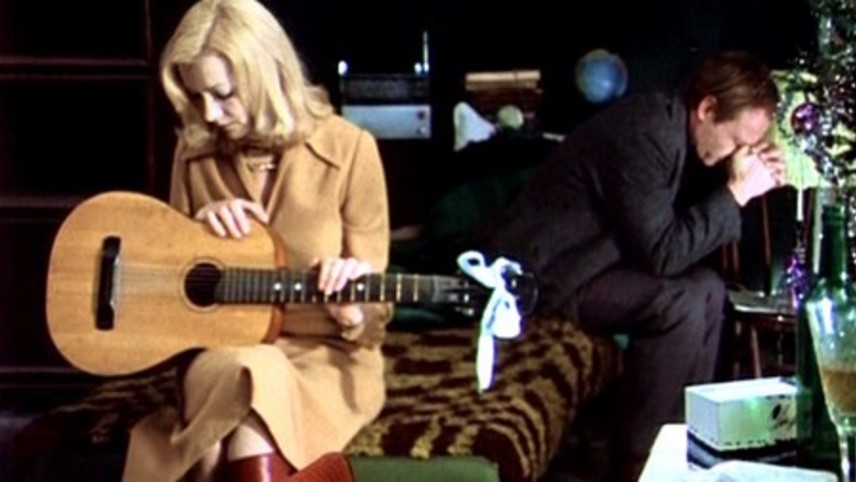[one_half]
The Irony of Fate, or Enjoy Your Bath
Written by Emil Braginskiy, Eldar Ryazanov
Directed by Eldar Ryazanov
Soviet Union, 1975
As the Holy Grail of Soviet cinema, The Irony of Fate, or Enjoy Your Bath is responsible every year for religious gatherings of zealous Russians around television sets within a few hours of ringing in the New Year. For close to 40 years, Eldar Ryazanov’s most famous and celebrated film has enjoyed a cherished prestige comparable to that of Frank Capra’s It’s a Wonderful Life. With all of the spirited comedy, coy romance, and poetry typical of a Ryazanov film, The Irony of Fate explores the intrinsic desires and complications of everyday people in an extraordinary situation.
Bumbling Zhenya Lukashin (Andrei Magkov) will gladly tell you, a number of times, of his traditional trip to the banya with his friends on New Year’s Eve. No doubt he will inform you of the trepidations he felt as he bundled up his fiancé before stepping out of his Moscow apartment into the bitter grasp of the evening. What he certainly could not foretell was his drunken displacement into Leningrad, now St. Petersburg, and the resulting encounter of one fateful night—a sleepless nocturne that would shake several lives. The film reflects the budding relationship between hapless Zhenya and the lovely Nadya Shevelyova (Barbara Brylska).

[/one_half]
[one_half_last]

Typical not only of Ryazanov’s work but many Soviet films en bloc, sociopolitical references easily find their way into the script. Were it not for the insufferable monotony of Soviet urbanization and architecture, Zhenya would have never unlocked the door to Nadya’s Leningrad apartment, firmly believing that he was home in Moscow. In its favour, such monologue plays only a fleeting note in the orchestration of the film’s events, with the script instead prioritizing the relationships between the protagonists and, consequently, their significant others. As a result, the lack of brooding and blatant symbolism makes The Irony of Fate entirely welcome to audiences far beyond Russia’s glorious Ryazanov cult.
That is not to say that the film is entirely purged of ideological struggles. Several poignant scenes explore Nadya’s tragic resolve to her comfortable stability with Ippolit (Yuriy Yakovlev) and thus conceding her desire for sensuality and stimulating companionship. Zhenya is torn between the fiancée waiting for him in his apartment and the gravity of his encounter. An unprecedented New Year’s Eve in Leningrad tolls the bells of possibility, affirming that greatness and true passions are inaccessible to those incapable of the ludicrous. When Nadya proclaims “We’ve gone a little bit insane”, all the distance and impediments, which were for some quenching moments boldly brushed aside, crumble down like the wretched concrete of faceless buildings in disrepair.
[/one_half_last]
With all of the inherent complexities of conflicted and mature romance, The Irony of Fate ambles along with the simplicity and lightness of child’s play. A cheeky Cupid tosses the dice on protagonists suppressing the suffocation they feel in their respective situations, and idealizes two soul-mates meeting under the most improbable circumstances. She is a school-teacher of literature, he is a doctor. Both share verse through guitar. Both are touched by an unrelenting sensitivity to the subtle and romantic. The complications of their long-standing relationships and engagements are almost trivialized in favour of developing their romance. Does this inadvertently glorify the selfish undercurrents that sweep Nadya and Zhenya into a meandering dance, quarantining them from their existing relationships? Perhaps. This may very well be a question posed by abandoned Galya (Olga Naumenko) and humiliated Ippolit. Without the sympathetic characters and idealism, we are left with a man who ends up in a stranger’s apartment and plays a crucial role in the unmaking of her current relationship.

The crochet of music and poetry that plays an integral role in crafting the character dynamics is a nostalgic treasure for lovers of Soviet cinema. The magical melancholy of Mikhail Tariverdeiev and a sprinkling of poetry by cherished names like Marina Tsvetaeva, Bella Akhmadulina, and Boris Pasternak make for a soundtrack that gives voice to unspoken sentiments and even delivers some of the most electrifying instants between Nadya and Zhenya. Tinged with quiet sorrow and longing, the classic melodies are a most graceful addition to a film that otherwise incorporates a fair share of physical comedy and the tongue-in-cheek humour of Zhenya’s “Aria of a Visitor from Moscow”.
The Irony of Fate never fails to turn sympathetic smiles into the cheek-rupturing grins of diehard dreamers. In the glittering night washed over the soulless landscape of utilitarian Soviet apartment blocks, two stranded romantics find each other and are forced to reconcile their lives on the cusp of the New Year. When the daylight falls on the white-washed facades that spun this wild story, they are left with the concrete of their own realities and decisions to make in their relationships. It is a fool’s game, but even the most implausible romance became entirely possible on New Year’s Eve somewhere over Leningrad and Moscow.
– Lital


